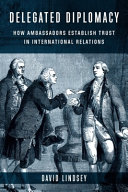

Most ebook files are in PDF format, so you can easily read them using various software such as Foxit Reader or directly on the Google Chrome browser.
Some ebook files are released by publishers in other formats such as .awz, .mobi, .epub, .fb2, etc. You may need to install specific software to read these formats on mobile/PC, such as Calibre.
Please read the tutorial at this link: https://ebookbell.com/faq
We offer FREE conversion to the popular formats you request; however, this may take some time. Therefore, right after payment, please email us, and we will try to provide the service as quickly as possible.
For some exceptional file formats or broken links (if any), please refrain from opening any disputes. Instead, email us first, and we will try to assist within a maximum of 6 hours.
EbookBell Team

0.0
0 reviewsWhy do states still need diplomats? Despite instantaneous electronic communication and rapid global travel, the importance of ambassadors and embassies has in many ways grown since the middle of the nineteenth century. However, in theories of international relations, diplomats are often neglected in favor of states or leaders, or they are dismissed as old-fashioned.
David Lindsey develops a new theory of diplomacy that illuminates why states find ambassadors indispensable to effective intergovernmental interaction. He argues that the primary diplomatic challenge countries face is not simply communication--it is credibility. Diplomats can often communicate credibly with their host countries even when their superiors cannot because diplomats spend time building the trust that is vital to cooperation. Using a combination of history, game theory, and statistical analysis, Lindsey explores the logic of delegating authority to diplomats. He argues that countries tend to appoint diplomats who are sympathetic to their host countries and share common interests with them. Ideal diplomats hold political preferences that fall in between those of their home country and their host country, and they are capable of balancing both sets of interests without embracing either point of view fully.Delegated Diplomacy is based on a comprehensive dataset of more than 1,300 diplomatic biographies drawn from declassified intelligence records, as well as detailed case studies of the U.S. ambassadors to the United Kingdom and Germany before and during World War I. It provides a rich and insightful account of the theory and practice of diplomacy in international relations.